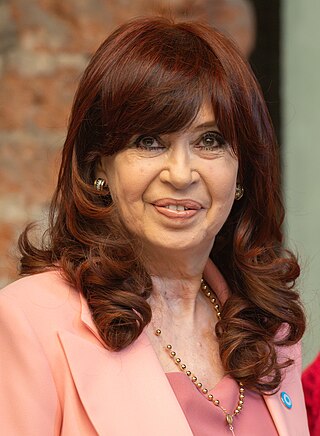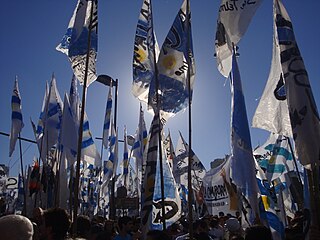
Néstor Carlos Kirchner Ostoić was an Argentine lawyer and politician who served as the President of Argentina from 2003 to 2007. A member of the Justicialist Party, he previously served as Governor of Santa Cruz Province from 1991 to 2003, and mayor of Río Gallegos from 1987 to 1991. He later served as the first ever First Gentleman of Argentina during the first tenure of his wife, Cristina Fernández de Kirchner. Ideologically, he identified himself as a Peronist and a progressive, with his political approach called Kirchnerism.

Alberto Ángel Fernández is an Argentine politician, lawyer, and academic who served as President of Argentina from 2019 to 2023. He was also the Chief of the Cabinet of Ministers from 2003 to 2008. His tenure as Cabinet Chief remains the longest since the post was created in 1994.

Cristina Elisabet Fernández de Kirchner, often referred to by her initials CFK, is an Argentine lawyer and politician who served as President of Argentina from 2007 to 2015 and later as Vice President of Argentina from 2019 to 2023 under President Alberto Fernández, as well as the first lady of Argentina during the tenure of her husband, Néstor Kirchner, from 2003 to 2007. She was the second female president of Argentina and the first elected female president of Argentina. Ideologically, she identifies herself as a Peronist and a progressive, with her political approach called Kirchnerism. Since 2024, she has been the president of the Justicialist Party, the main opposition party to the government of Javier Milei.

Felipe Solá is an Argentine agricultural engineer and politician. He previously served as Governor of Buenos Aires Province, from 2002 to 2007, and as Minister of Foreign Affairs and Worship under President Alberto Fernández, from 2019 to 2021.

Mauricio Macri is an Argentine businessman and politician who served as President of Argentina from 2015 to 2019. He has been the leader of the Republican Proposal (PRO) party since its founding in 2005. He previously served as Chief of Government of Buenos Aires from 2007 to 2015, and was a member of the Chamber of Deputies representing Buenos Aires from 2005 to 2007. Ideologically, he identifies himself as a liberal and conservative on the Argentine centre-right.

The Front for Victory was a centre-left Peronist electoral alliance in Argentina, and is formally a faction of the Justicialist Party. Former presidents Néstor Kirchner and Cristina Fernández de Kirchner were elected as representatives of this party.

Julio César Cleto Cobos is an Argentine politician who was the Vice President of Argentina in the administration of President Cristina Fernández de Kirchner from 2007 to 2011. He started his political career as member of the Radical Civic Union party (UCR), becoming Governor of the Province of Mendoza in 2003. He was expelled from the UCR in 2007, and was then selected by presidential candidate Cristina Fernández de Kirchner, of the ruling Front for Victory (FpV), as her candidate for vice-president in the elections of that year, which they won.

Martín Lousteau is an Argentine economist and politician of the Radical Civic Union (UCR). He is a National Senator for the City of Buenos Aires. Since 2023, he has been President of the UCR National Committee.

Eric Calcagno y Maillmann is an Argentine sociologist, journalist, diplomat and politician. A member of the Justicialist Party, Calcagno served terms in both houses of the Argentine Congress, first as a Senator from 2007 to 2011, and later as a Deputy from 2011 to 2015. He was Argentina's ambassador to France from 2005 to 2007.
Events in the year 2008 in Argentina.

Julián Andrés Domínguez is an Argentine Justicialist Party politician of the Justicialist Party. He was twice Minister of Agriculture, in the cabinets of presidents Alberto Fernández (2021–2022) and Cristina Fernández de Kirchner (2009–2011).

The Argentine Governments of Néstor Kirchner and Cristina Fernández de Kirchner had several conflicts with major media groups. Kirchner accused the Clarín Group, La Nación, Perfil, and related media of having promoted their overthrow.

The Presidency of Cristina Fernández de Kirchner began on 10 December 2007, when she became president of Argentina. She was an Argentine senator for the Buenos Aires Province at the time of her victory in the 2007 presidential election. Cristina Fernández de Kirchner became the second female president of Argentina, and the first one directly elected as such. In elections of November 2015, she was succeeded by Mauricio Macri as president.

La Cámpora is an Argentine left-wing political youth organization supporting the governments of Néstor Kirchner, Cristina Fernández de Kirchner, and Alberto Fernández. It is named after former Peronist president Héctor José Cámpora. It was established by Máximo Kirchner in 2006 and became politically prominent after the death of former president Néstor Kirchner. This organization also promotes awareness or activism of Human rights in Argentina.

Norberto Gustavo Yauhar is an Argentine politician. He was designated Minister of Agriculture by President Cristina Fernández de Kirchner in 2011, serving in the post until 2013.

A number of cacerolazos, pot-banging protests, took place in several cities of Argentina on September 13 and November 8, 2012. The first, in September 13, was a national protest against the policies of the president Cristina Fernández de Kirchner. The protests generated significant repercussions in local politics. The second, on November 8, was another much more massive protest in several cities in Argentina, including Buenos Aires, Córdoba, Rosario, Mendoza, Olivos, among many others throughout Greater Buenos Aires and other regions. There were also protests in Argentine embassies and consulates in cities such as New York, Miami, Madrid, Sydney, Bogotá, Santiago and Barcelona, among others. Its complaints were almost the same, but the difference in size was very big. The protests are considered not only a call to Kirchnerism, but also to the opposition, because they did not have a strong leader.
Cristina Fernández de Kirchner was the President of Argentina between 2007 and 2015 and the Vice President of Argentina between 2019 and 2023.
Relato K is the name given by their critics to the alleged propaganda that promotes Kirchnerism in Argentina. The expression has been part of Argentine public debate during the 2010s and 2020s and thus frequently used by journalists and politicians. The concept has also been used and studied by historians and political scientists.

The Ministry of Agriculture, Livestock and Fisheries of Argentina, commonly known simply as the Ministry of Agriculture, was a ministry of the national executive power that oversaw production, commerce and health regulations in the agricultural, livestock and fishing industries.
















